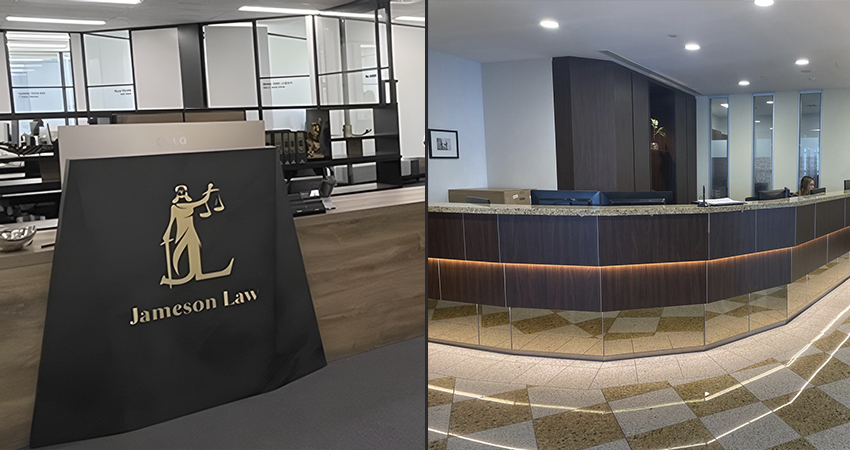APPREHENDED VIOLENCE ORDER (AVO)
WE GET IT
WE'RE IN IT TO WIN IT
Book your consultation
- This form submission is encrypted and secured to ensure your information remains confidential.
This form submission is encrypted and secured to ensure your information remains confidential.
Don't let an AVO restrict you from getting on with your life. Our AVO experts will advise you on your rights.
Award Winning Criminal Law Experts
We have won several criminal defence and client service excellence awards every year up to and including 2025.
Proven Track Record
60+ Years of combined experience defending criminal matters means a successful outcome is on the table.
5 Star Reviews Everywhere
We’re in it to win it and we fight hard for our clients. That’s why anywhere you look you will find 5 star reviews.
Easy Finance Options
Get urgent premium legal representation now and pay later with affordable fortnightly or monthly payments.
Award Winning Criminal Law Experts
We have won several criminal defence and client service excellence awards every year up to and including 2025.
Proven Track
Record
60+ Years of combined experience defending criminal matters means a successful outcome is on the table.
5 Star Reviews
Everywhere
We’re in it to win it and we fight hard for our clients. That’s why anywhere you look you will find only 5 star reviews.
Easy Finance
Options
Get urgent premium legal representation now and pay later with affordable fortnightly or monthly payments.
Do you have an AVO against you?
AVOs are a complex area of law governed by the Crimes (Domestic and Personal Violence) Act 2007. An AVO on its own is not a criminal matter and falls under the civil jurisdiction of the courts. It has a lower burden of proof that needs to be met (on the balance of probabilities). In the opinion of the court, the events alleged are likely to have occurred. If an AVO has charges attached to it, e.g. malicious damage, then the charges fall under the criminal jurisdiction of the court. Criminal charges have a separate burden of proof (beyond reasonable doubt) and increase the seriousness of the matter. The complexities of AVOs mean that it is essential you have appropriate and reliable legal representation. Jameson Law know how to navigate the complexities of the legal system and can take the stress out of applying for or defending an AVO.

What is an AVO?
In New South Wales, a restraining order is known as an AVO. It is an enforceable court order for the safety and protection of an individual or group of people. There are two (2) types of apprehended violence orders:
1. Apprehended Domestic Violence Order (ADVO)
2. Apprehended Personal Violence Order (APVO)
Apprehended Domestic Violence Orders (ADVOs)
ADVOs apply where incidents of alleged domestic or family violence offences have occurred. Domestic violence offences are an offence committed by one person against another person with whom the person who commits the offence has (or had) a domestic relationship. This means anyone you have or had an intimate relationship with such as a partner, child, roommate, etc.
Domestic violence offences are not just acts of physical violence such as assaulting someone. They can include actions or behaviour such as stalking, harassing or intimidating, causing a fear of mental or physical harm. For example, unwanted phone/social media contact.
Apprehended Personal Violence Orders
Apprehended Personal Violence Orders apply where incidents of alleged personal violence offences have occurred. The court only needs to be satisfied that the PINOP (person in need of protection) has reasonable grounds to fear and in fact fears:
![]() An act of violence; OR
An act of violence; OR
![]() Intimidation; OR
Intimidation; OR
![]() Stalking
Stalking
In a nutshell...
There are two types of AVOs:
1. Apprehended Domestic Violence Order (ADVO) -past or current domestic/intimate relationships. This includes children
2. Apprehended Personal Violence Order (APVO) – applies to anyone else e.g. colleagues

What happens if I’m served with an AVO?
If you are served with an AVO, you should contact a legal practitioner as soon as possible, especially if criminal charges are included. If you have any evidence to contradict the AVO, you should make copies of it and give it to your lawyer. Do NOT contact the protected person as this may result in you breaching the order. If you have family law proceedings in process and you need to communicate with the other party, it is best to do so through your lawyer.In a nutshell...
Get legal advice. Do NOT contact the other party.
Should I agree to an AVO?
You should NOT agree to an AVO without consulting a legal practitioner first. Agreeing to an AVO can have serious consequences. For example, if you work in the security industry, it may impact on your ability to maintain a firearms licence. If you require a Working with Children Check as part of your employment, an AVO can impact on your clearance if children are included in the order. While an AVO is not a criminal matter, an order and any charges attached to it can impact on your ability to obtain a visa for countries such as the United States of America. AVOs can also impact on family law and immigration matters.
In a nutshell...
Do NOT agree to an AVO before getting legal advice. It can have serious consequences.
Do you have to go to court for an AVO?
Yes. Once you or the police make an application for an AVO, the matter will go before the court so both parties can present their evidence. If the police make the application on your behalf, they will present your matter to the court, however, you may be required to give evidence. If you decide you no longer want the police to continue with your matter, you should speak to the officer in charge of your matter. However, the police may continue with the application if they fear for your safety based on available evidence or there are children involved. If you make an application to the court, you will be required to present your case to the court. You will need to present any evidence you have to the court. For example, witness statements, text messages, photos, social media messages, etc. If you have witness statements, your witnesses must come to court to provide oral evidence. If you are concerned about your safety at court, contact the court to enquire about their DV safe room.In a nutshell...
You and your witnesses will be required to attend court for an AVO
How long does an AVO last for?
An APVO lasts for as long as the court specifies. In the absence of a specified date, the order lasts for 12 months after the date the order is made.
An ADVO lasts for as long as the court specifies. In the absence of a specified date, the order lasts for two (2) years after the date the order is made. However, if the defendant is under the age of 18 at the time the order is made and no time limit has been given, the order lasts for one (1) year.
In a nutshell...
The length of time an AVO lasts is up to the court and depends on the seriousness of the allegations made.

In a nutshell...
You and your witnesses will be required to attend court for an AVO
AVO Process in NSW:
The AVO process is slightly different depending on who makes the application for an order:Police Applications
Where investigating police hold concerns for the safety of the PINOP (person/s in need of protection), they will issue a Provisional Order. This order is enforceable until the matter goes to court. The order will include the mandatory conditions 1 (a), (b) and (c) as well as any additional orders required.w
Provisional Order Issued by Police
The Court Attendance Notice will indicate the date, time and Court that you need to attend. This can be found at the top of the first page of your Court Attendance Notice. Your matter will be listed for mention before a Magistrate at which time, you can elect to either:
1. Adjourn the matter to obtain legal advice if you have not already done so in which case your matter will be listed on another day for mention; or
2. Enter a plea of guilty or not guilty. Note: entering a plea of guilty means that you admit that you are guilty of the charge although you may not agree with everything written in the police facts. Entering a plea of not guilty means you do not admit to the charge. The matter will be adjourned to another day for hearing if you plead not guilty or sentencing may be done on the spot for summary offences if you enter a plea of guilty.
If your matter is considered an indictable offence, it may be necessary to move the matter to the District Court or the Supreme Court depending on the severity of the offence. In saying that section 475A of the Crimes Act 1900 provides that the Supreme Court can also hear summary offences of conspiracy to cheat and defraud:
…proceedings for any offence mentioned in Schedule 10 may, pursuant to Part 5 of Chapter 4 of the Criminal Procedure Act 1986 by the Attorney-General or the Director of Public Prosecutions, be taken before the Supreme Court in its summary jurisdiction.
Court Mention
A mention date will be set by the court for the matter to be heard. At the mention, the defendant (person fighting the ADVO) can consent to the order or defend it. If they consent to it, that means they agree to the terms of the order and agree to follow it. The matter is finished and a final AVO is made. Some jurisdictions provide a third option that allows defendants to make an undertaking, a promise to the court not to do certain things.
If they decide to defend it, a new date for a brief mention will be set by the court and dates each party (the police and the defendant) must supply copies of their evidence. The court will review the provisional ADVO issued by police and will make any necessary changes. This is known as an Interim AVO.
Brief Mention to Defend AVO
A brief mention is similar to a meeting between parties that takes place in court. It allows both parties to inform the court of any evidence that may be missing or any amendments that need to be made. The court then sets a date for a hearing. The Interim AVO remains in place until the hearing date and must be complied with.
Hearing
The hearing is the final step in the process. Both parties present their evidence and the court makes a final order. If you have charges attached to your AVO and are found guilty of the charges, the court will automatically enforce an AVO. Once a final order is made, breaches of that order are dealt with under criminal law.
Hearing
The hearing is the final step in the process. Both parties present their evidence and the court makes a final order. If you have charges attached to your AVO and are found guilty of the charges, the court will automatically enforce an AVO. Once a final order is made, breaches of that order are dealt with under criminal law.
Personal Applications
Contact a legal practitioner or your local court to ask about how you can make an AVO application. An application has very specific requirements that must be met.
Apply
Lodge your application.
Court Mention
A mention date will be set by the court for the matter to be heard. At the mention, the defendant (person fighting the ADVO) can consent to the order or defend it. If they consent to it, that means they agree to the terms of the order and agree to follow it. The matter is finished and a final AVO is made. Some jurisdictions provide a third option that allows defendants to make an undertaking, a promise to the court not to do certain things.
If they decide to defend it, a new date for a brief mention will be set by the court and dates each party (the applicant and the defendant) must supply copies of their evidence. The court will review the orders sought on the application and may issue an Interim Order.
Brief Mention to Defend AVO
A brief mention is similar to a meeting between parties that takes place in court. It allows both parties to inform the court of any evidence that may be missing or any amendments that need to be made. The court then sets a date for a hearing. The Interim AVO remains in place until the hearing date and must be complied with.
Hearing
The hearing is the final step in the process. Both parties present their evidence and the court makes a final order.
Case Study
Penny and Rob have been in a relationship for 5 years. The relationship ended 6 months ago. Since the end of the relationship Rob has been receiving numerous phone calls and Facebook messages from Penny, up to 50 a day. He has ignored the calls and messages but kept a record of them. Penny has started messaging his friends and has made Facebook posts about his new girlfriend. Rob has spoken to police, but has been told nothing can done at the moment. Rob spoke with a lawyer and received advice about making an application for an ADVO. With their help, he successfully applied for an ADVO that protects himself and his new partner.
Disclaimer
The above is general legal information and should not be considered legal advice. You should speak with one of our criminal lawyers for legal advice tailored to your specific legal matter. The penalties listed are maximum penalties. The courts deal with matters on a case by case basis. It should also be noted that there may be court delays due to COVID-19.
Speak to an Expert Lawyer today

WE'RE IN IT TO WIN IT
Book your consultation
- This form submission is encrypted and secured to ensure your information remains confidential.
This form submission is encrypted and secured to ensure your information remains confidential.
What our Clients Say
Related Criminal Law News and Resources
Our AVO Lawyers will fight hard for a good outcome.
Applying for an AVO in NSW: Your Rights and the Legal Process What Is an Apprehended Violence Order (AVO)? If
The Facts behind the Common Assault Charge Our client, a middle-aged bank worker residing with her partner whom she had
We understand that disputes with your neighbours can arise over the smallest of disagreements. Usually, both parties begin with the
The Facts behind the Common Assault Charge Our client, a middle-aged bank worker residing with her partner whom she had
FAQs
Frequently Asked Questions.
What is meant by domestic violence?
An offence committed by a person against another person with whom the person who commits the offence has (or has had) a domestic relationship being –
a) a personal violence offence; or
b) an offence (other than a personal violence offence) that arises from substantially the same circumstances as those from which a personal violence offence has arisen; or
c) an offence (other than a personal violence offence) the commission of which is intended to coerce or control the person against whom it is committed or to cause that person to be intimidated or fearful (or both)
How long does the AVO process take?
Can you put an AVO on anyone?
- The commission of personal or domestic violence offence; OR
- Intimidation; OR
- Stalking
It is an offence to make false statements and can result in 12 months imprisonment, a fine of $1100.00 or both.
What happens if you breach an AVO in NSW?
Can I get an AVO without police assistance?
What is the difference between an AVO and an ADVO?
1. Apprehended Domestic Violence Order (ADVO)
2. Apprehended Personal Violence Order (APVO)
ADVOs apply where incidents of alleged domestic or family violence offences have occurred. Domestic violence offences are an offence committed by one person against another person with whom the person who commits the offence has (or had) a domestic relationship. This means anyone you have or had an intimate relationship with such as a partner, child, roommate, etc.
Apprehended Personal Violence Orders apply where incidents of alleged personal violence offences have occurred. For example between friends, work colleagues, neighbours, etc.
What are the mandatory conditions of an AVO?
You must not do any of the following to <protected people>, or anyone she/he/they has/have a domestic relationship with:
(a) assault or threaten her/him/they,
(b) stalk, harass or intimidate her/him/they, and
(c) intentionally or recklessly destroy or damage any property or harm an animal that belongs to or is in the possession of protected people.
This order will remain in place even if you successfully applied to have the AVO amended to remove other conditions.
How can I revoke and AVO / ADVO?
a) The Police have made the application on behalf of the PINOP and hold concerns for the PINOP’s safety
b) The PINOP does not consent to the Order being changed or revoked
c) The Court is not satisfied that it is appropriate to do so
What happens if I breach my ADVO / AVO?
The Police regularly conduct compliance checks to make sure people are complying with their ADVO/APVOs, however, anyone can make a report to the Police that an order is not being complied with.
The Police will investigate the allegations and determine whether a breach has occurred. If they believe it has, you can be arrested and charged with contravene prohibition/restriction in AVO. You may or may not be granted bail, depending on the seriousness of the breach, and required to appear in Court at a later date.
Breaching an AVO is a serious criminal offence and can result in a criminal conviction. The maximum penalty for breaching an AVO is 2 years imprisonment or a fine of $5,500.00 or both.
Is a domestic violence order considered serious?
It is important to realise that domestic violence offences are dealt with in the same way that other criminal offences are dealt with by the Court. Do not take this lightly and seek legal advice as soon as you become aware of any charges being brought against you in that regard.
WE'RE IN IT TO WIN IT
Book your consultation
- This form submission is encrypted and secured to ensure your information remains confidential.
This form submission is encrypted and secured to ensure your information remains confidential.
OUR SYDNEY OFFICES
Parramatta CBD - Head Office
- (02) 8806 0866
- 0488 817 882
- 02 9052 0840
- info@jamesonlaw.com.au
- Suite 301, 67-69 Philip St Parramatta NSW 2150
Sydney CBD - Practice Office
- 02-8806-0866
- 0488 817 882
- 02 9052 0840
- info@jamesonlaw.com.au
- Tower One Barangaroo International Towers Level 35, 100 Barangaroo Ave Sydney NSW 2000
Blacktown CBD - Practice Office
- (02) 8806 0866
- 0488 817 882
- 02 9052 0840
- info@jamesonlaw.com.au
-
Level 3 81 Flushcombe Road, Blacktown NSW 2148
(By Appointment Only)

Liverpool CBD - Practice Office
- (02) 8806 0866
- 0488 817 882
- 02 9052 0840
- info@jamesonlaw.com.au
-
Level 2, 215-219 George Street, Liverpool NSW 2170
(By Appointment Only)

Bankstown CBD - Practice Office
- (02) 8806 0866
- 0488 817 882
- 02 9052 0840
- info@jamesonlaw.com.au
-
23 Restwell Street, Bankstown NSW 2200
(By Appointment Only)



Court Houses We Frequent
Local Courts
Balmain Local Court
- 1300 679 272
- local-court-burwood@justice.nsw.gov.au
- 368 Darling Street, Balmain NSW 2041
Registry: Monday to Friday, 9:00am to 4:30pm
Bankstown Local Court
- 1300 679 272
- (02) 9722 6060
- PO Box 71 BANKSTOWN NSW 2200
- local-court-bankstown@justice.nsw.gov.au
- Cnr Chapel Road and The Mall BANKSTOWN NSW 2200
Court Operating Hours: 9:30am-4:30pm
Blacktown Local Court
- 1300 679 272
- (02) 9672 2666
- PO Box 217 BLACKTOWN NSW 2148
- local-court-blacktown@justice.nsw.gov.au
- 1 Kildare Road Blacktown NSW 2148
Registry Hours: 9:00 – 4:30
Telephone Hours: 8:30 -4:30
Days open: Mon-Fri
Burwood Local Court
- 1300 679 272
- (02) 9744 4144
- PO Box 235 BURWOOD NSW 1805
- local-court-burwood@justice.nsw.gov.au
- 7-9 Belmore Street BURWOOD NSW 2134
Registry Hours: 9:00 – 4:30
Telephone Hours: 8:30 – 4:30
Days open: Mon – Fri
Campbell Local Court
- 1300 679 272
- (02) 9821 7888
- PO Box 3435 LIVERPOOL WESTFIELDS NSW 2170
- local-court-campbelltown@justice.nsw.gov.au
- 150 George Street LIVERPOOL NSW 2170
Registry Hours: 9:00 – 4:30
Telephone Hours: 8:30 – 4:30
Days open: Mon – Fri
Central Local Court
- 1300 679 272
- (02) 4223 3633
- PO Box 5395 WOLLONGONG NSW 2500
- local-court-wollongong@justice.nsw.gov.au
- Cnr Market and Church Streets WOLLONGONG NSW 2500
Registry Hours: 9:00 – 1:00 and 2:00 – 4:30
Telephone Hours: 8:30 – 4:30
Downing Local Court
- 1300 679 272
- (02) 4223 3633
- PO Box 5395 WOLLONGONG NSW 2500
- dclc@justice.nsw.gov.au
- 143-147 Liverpool Street, Sydney NSW 2000
- Nearest Train Station: Museum Station (Liverpool Street entrance is directly opposite)
- Levels: Local Court matters are heard on levels 4 and 5.
- Public Transport: Well-served by buses and trains, with easy access to nearby bus stops and Museum Station.
- Parking: Limited street parking is available, and there are several public parking garages nearby.
Registry Hours: 9:00 – 1:00 and 2:00 – 4:30
Telephone Hours: 8:30 – 4:30
Wollongong Local Court
- 1300 679 272
- (02) 4223 3633
- PO Box 5395 WOLLONGONG NSW 2500
- local-court-wollongong@justice.nsw.gov.au
- Cnr Market and Church Streets WOLLONGONG NSW 2500
Registry Hours: 9:00 – 1:00 and 2:00 – 4:30
Telephone Hours: 8:30 – 4:30
Fairfield Local Court
- 1300 679 272
- (02) 4223 3633
- PO Box 5395 WOLLONGONG NSW 2500
- local-court-wollongong@justice.nsw.gov.au
- Cnr Spencer St & Court Rd, Fairfield NSW 2165
Registry Hours: 9:00 – 1:00 and 2:00 – 4:30
Telephone Hours: 8:30 – 4:30
Hornsby Local Court
- 1300 679 272
- (02) 9847 9955
- PO Box 96 HORNSBY NSW 1630
- local-court-hornsby@justice.nsw.gov.au
- 294 Peats Ferry Rd HORNSBY NSW 2077
Registry Hours: 9:00 – 1:00 and 2:00 – 4:30
Telephone Hours: 8:30 – 4:30
Liverpool Local Court
- 1300 679 272
- (02) 9722 6060
- PO Box 71 BANKSTOWN NSW 2200
- local-court-bankstown@justice.nsw.gov.au
- Cnr Chapel Road and The Mall BANKSTOWN NSW 2200
Registry Hours: 9:00 – 1:00 and 2:00 – 4:30
Telephone Hours: 8:30 – 4:30
Manly Local Court
- 1300 679 272
- (02) 9722 6060
- PO Box 71 BANKSTOWN NSW 2200
- local-court-bankstown@justice.nsw.gov.au
- Cnr Chapel Road and The Mall BANKSTOWN NSW 2200
Registry Hours: 9:00 – 1:00 and 2:00 – 4:30
Telephone Hours: 8:30 – 4:30
Newtown Local Court
- 1300 679 272
- (02) 9722 6060
- PO Box 71 BANKSTOWN NSW 2200
- local-court-bankstown@justice.nsw.gov.au
- Cnr Chapel Road and The Mall BANKSTOWN NSW 2200
Registry Hours: 9:00 – 1:00 and 2:00 – 4:30
Telephone Hours: 8:30 – 4:30
Parramatta Local Court
- 1300 679 272
- (02) 4223 3633
- PO Box 92 Parramatta NSW 2150, Australia
- local-court-parramatta@justice.nsw.gov.au
- 12 George Street Parramatta NSW 2150, Australia
Registry Hours: 9:00 – 1:00 and 2:00 – 4:30
Telephone Hours: 8:30 – 4:30
Penrith Local Court
- 1300 679 272
- (02) 9722 6060
- PO Box 71 BANKSTOWN NSW 2200
- local-court-bankstown@justice.nsw.gov.au
- Cnr Chapel Road and The Mall BANKSTOWN NSW 2200
Registry Hours: 9:00 – 1:00 and 2:00 – 4:30
Telephone Hours: 8:30 – 4:30
Sutherland Local Court
- 1300 679 272
- PO Box 37, Sutherland 2232
- local-court-sutherland@justice.nsw.gov.au
- Cnr Flora and Belmont Street, Sutherland NSW 2232
Registry Hours: 9:00 – 1:00 and 2:00 – 4:30
Telephone Hours: 8:30 – 4:30
Waverley Local Court
- 1300 679 272
- (02) 9722 6060
- PO Box 71 BANKSTOWN NSW 2200
- local-court-bankstown@justice.nsw.gov.au
- Cnr Chapel Road and The Mall BANKSTOWN NSW 2200
Registry Hours: 9:00 – 1:00 and 2:00 – 4:30
Telephone Hours: 8:30 – 4:30
Windsor Local Court
- 1300 679 272
- (02) 9722 6060
- PO Box 71 BANKSTOWN NSW 2200
- local-court-bankstown@justice.nsw.gov.au
- Cnr Chapel Road and The Mall BANKSTOWN NSW 2200
Registry Hours: 9:00 – 1:00 and 2:00 – 4:30
Telephone Hours: 8:30 – 4:30
Wollongong Local Court
- 1300 679 272
- (02) 9722 6060
- PO Box 71 BANKSTOWN NSW 2200
- local-court-bankstown@justice.nsw.gov.au
- Cnr Chapel Road and The Mall BANKSTOWN NSW 2200
Registry Hours: 9:00 – 1:00 and 2:00 – 4:30
Telephone Hours: 8:30 – 4:30
District Courts
Downing Centre District Court
- 1300 679 272
- PO Box 71 BANKSTOWN NSW 2200
- downingcentredc@justice.nsw.gov.au
- 143-147 Liverpool Street, Sydney NSW 2000
Registry Hours: 9:00 – 4:30
Telephone Hours: 8:30 – 4:30
Days open: Mon – Fri
Parramatta District Court
- (02) 8688 7777
- local-court-bankstown@justice.nsw.gov.au
- 12 George Street, Parramatta NSW 2150
Registry Hours: 9:00 – 4:30
Days open: Mon-Fri
Penrith District Court
- 1300 679 272
- local-court-penrith@justice.nsw.gov.au
- 64-72 Henry Street, Penrith NSW 2750
Registry Hours: 9:00 – 4:30
Days open: Mon-Fri
Campbelltown District Court
- 1300 679 272
- local-court-campbelltown@justice.nsw.gov.au
- Railway Street, Campbelltown NSW 2560
Registry Hours: 9:00 – 4:30
Days open: Mon – Fri
Liverpool District Court
- 1300 679 272
- local-court-liverpool@justice.nsw.gov.au
- 150 George Street, Liverpool NSW 2170
Registry Hours: 9:00 – 4:30
Days open: Mon – Fri
Wollongong District Court
- 1300 679 272
- local-court-wollongong@justice.nsw.gov.au
- 97-99 Market Street, Wollongong NSW 2500
Registry Hours: 9:00 – 1:00 and 2:00 – 4:30
Telephone Hours: 8:30 – 4:30
Supreme Courts
Supreme Court New South Wales
- 1300 679 272
- (02) 9230 8025
- (02) 9230 8233
- GPO Box 3 Sydney NSW 2001 Australia
- sc.enquiries@justice.nsw.gov.au
- Law Courts Building 184 Phillip Street Sydney NSW 2000
Registry Hours: 9:00 AM – 4:30 PM
Telephone Hours: 8:30 AM – 4:30 PM
Days Open: Monday to Friday
Federal Court
Federal Circuit and Family Court of Australia
- 1300 352 000
- (02) 9230 8000
- GPO Box 9991, Sydney NSW
- enquiries@fcfcoa.gov.au
- Lionel Bowen, Building, 97/99 Goulburn St, Sydney NSW 2001
Registry Hours: 9:00 AM – 4:30 PM
Telephone Hours: 8:30 AM – 5:00 PM
Days Open: Monday to Friday
Federal Court
- 1300 720 980
- (02) 9230 8020
- GPO Box 9991, Sydney NSW
- enquiries@fedcourt.gov.au
- 97-99 Goulburn St in the heart of the Sydney CBD
Monday to Friday, 8:30 AM – 4:30 PM
High Court
- (02) 6270 6811
- (02) 6270 6868
- Parkes Place, Canberra ACT 2600
- enquiries@hcourt.gov.au
- Parkes Place, Canberra ACT 2600
Monday to Friday, 8:30 AM – 5:00 PM
Specialised Courts
Children’s Court of New South Wales
- 1300 679 272
- (02) 9722 6060
- Cnr Chapel Road and The Mall BANKSTOWN NSW 2200
- PO Box 71 BANKSTOWN NSW 2200
- sc.enquiries@justice.nsw.gov.au
Registry Hours: 9:00 AM – 4:30 PM
Telephone Hours: 8:30 AM – 4:30 PM
Days Open: Monday to Friday
Coroner’s Court New South Wales
- 1300 679 272
- (02) 9230 8025
- (02) 9230 8233
- GPO Box 3 Sydney NSW 2001 Australia
- sc.enquiries@justice.nsw.gov.au
- Law Courts Building 184 Phillip Street Sydney NSW 2000
Registry Hours: 9:00 AM – 4:30 PM
Telephone Hours: 8:30 AM – 4:30 PM
Days Open: Monday to Friday
Industrial Relations Commission of New South Wales
- 1300 679 272
- (02) 9230 8025
- (02) 9230 8233
- GPO Box 3 Sydney NSW 2001 Australia
- sc.enquiries@justice.nsw.gov.au
- Law Courts Building 184 Phillip Street Sydney NSW 2000
Registry Hours: 9:00 AM – 4:30 PM
Telephone Hours: 8:30 AM – 4:30 PM
Days Open: Monday to Friday
Land and Environment Court of New South Wales
- 1300 679 272
- (02) 9230 8025
- (02) 9230 8233
- GPO Box 3 Sydney NSW 2001 Australia
- sc.enquiries@justice.nsw.gov.au
- Law Courts Building 184 Phillip Street Sydney NSW 2000
Registry Hours: 9:00 AM – 4:30 PM
Telephone Hours: 8:30 AM – 4:30 PM
Days Open: Monday to Friday


